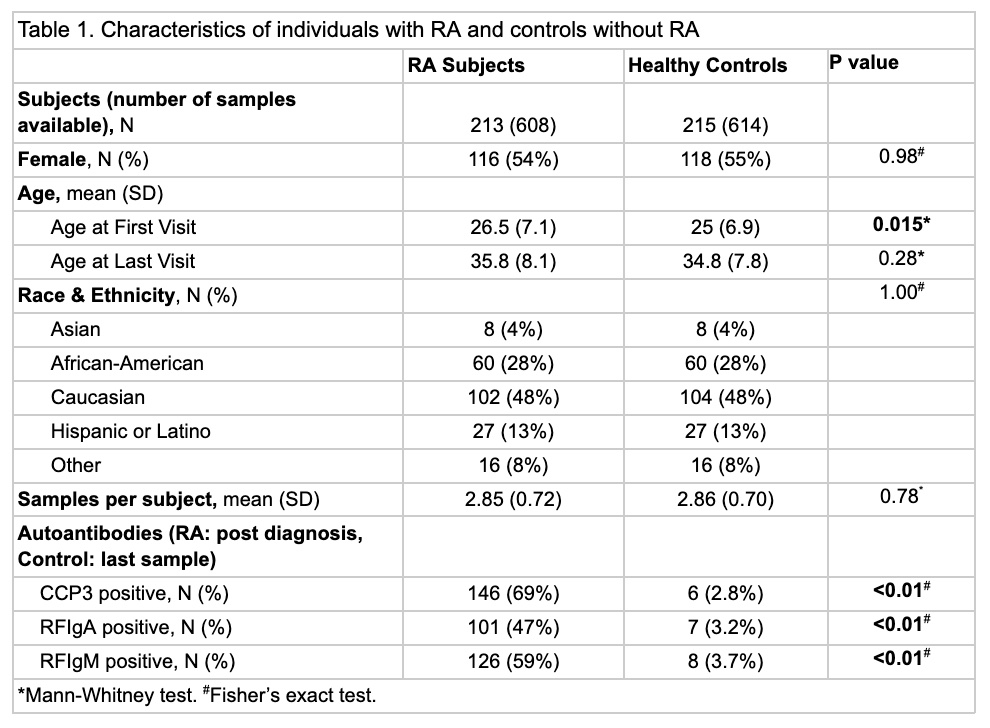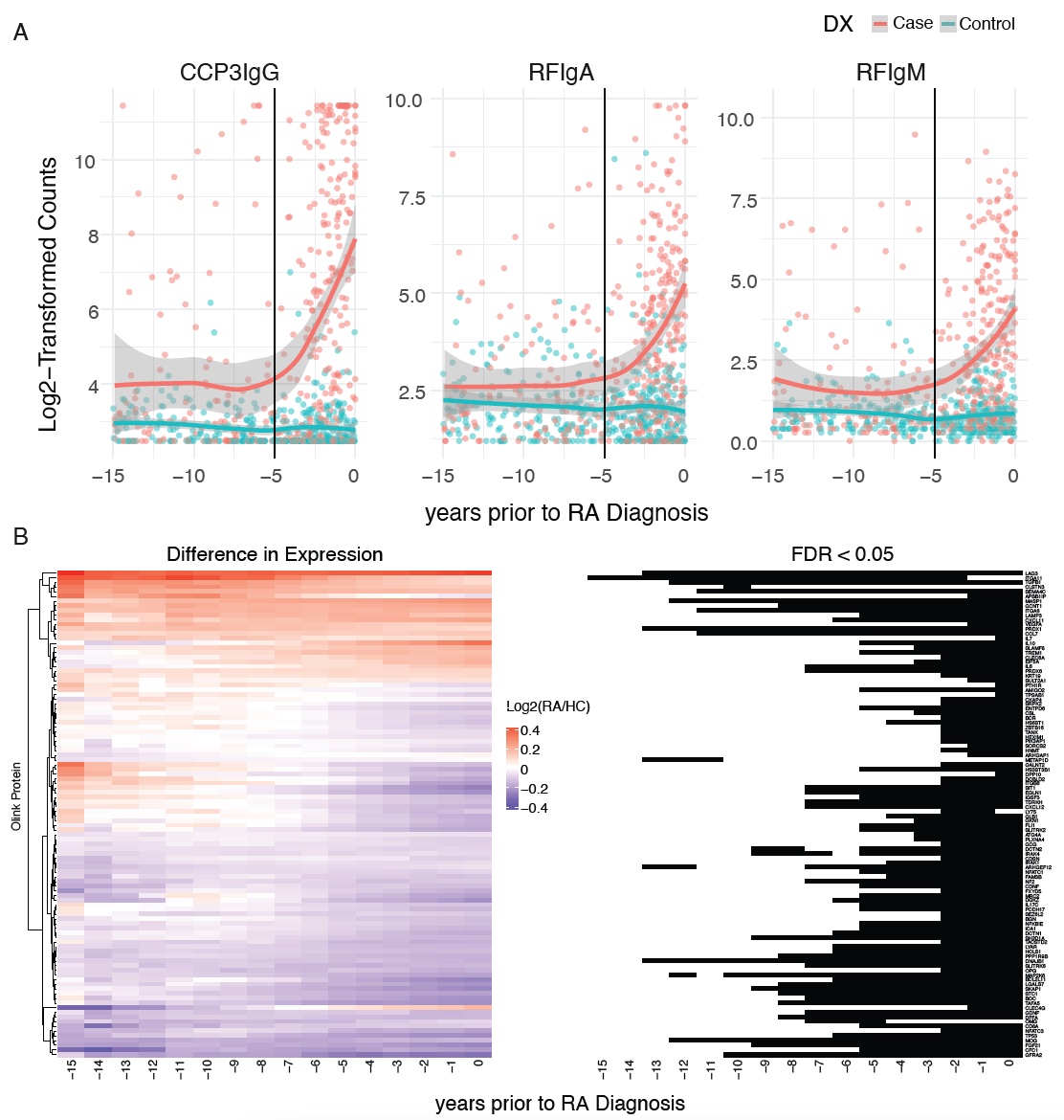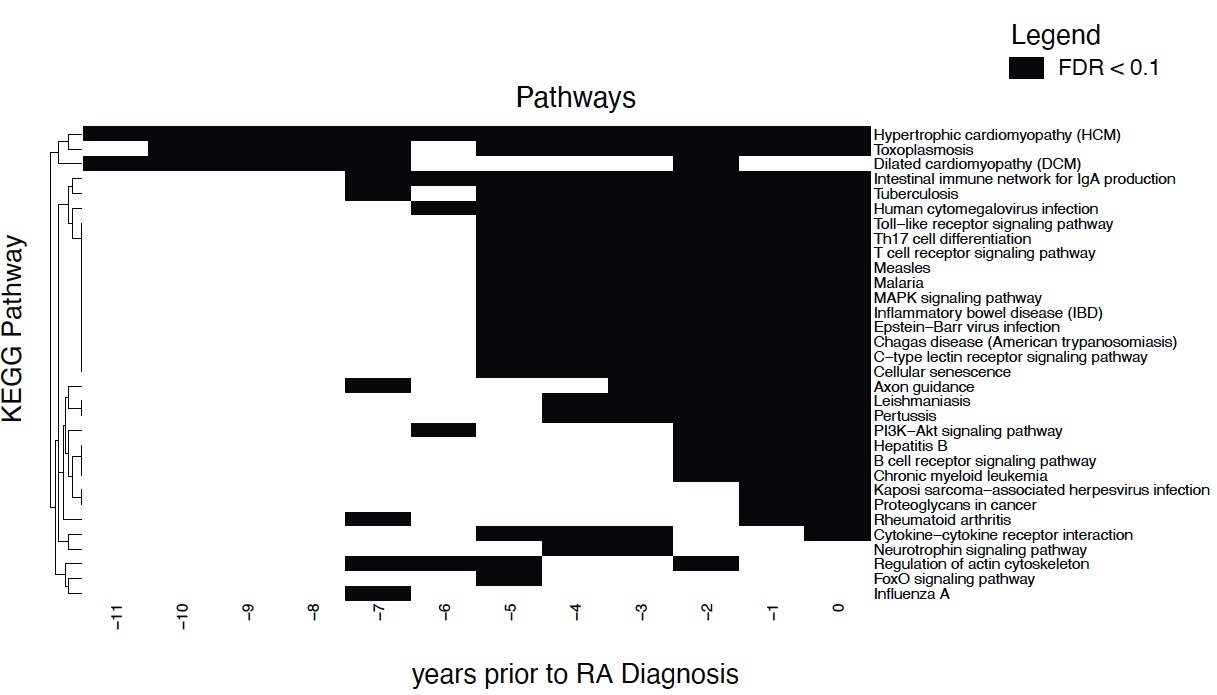Session Information
Date: Wednesday, November 15, 2023
Title: Abstracts: RA – Diagnosis, Manifestations, and Outcomes IV: Pre-RA & RA Diagnosis
Session Type: Abstract Session
Session Time: 11:00AM-12:30PM
Background/Purpose: Rheumatoid arthritis (RA) includes a stage of development that can be termed ‘pre-RA’ and defined as the presence of abnormal biomarkers and/or other features (e.g. articular symptoms) prior to the development of clinically-apparent synovitis (i.e. Clinical RA). In pre-RA, multiple interventions are being evaluated to prevent, delay or modulate future Clinical RA. However, the biologic pathways during the various stages of development in pre-RA are incompletely understood, and this ‘gap’ limits the ability to predict Clinical RA in at-risk populations as well as target the key pathways during disease development. To address this gap, we evaluated samples from the pre-RA period, and controls, from the Department of Defense Serum Repository (DoDSR) to test the hypothesis that proteomic testing can identify evolving biologic features in pre-RA that can ultimately be used to improve prediction for future Clinical RA and identify potential stage-specific targets for preventive interventions.
Methods: We evaluated 197 proteins on the Olink platform in serum from the DoDSR from the pre-RA period from 213 individuals with confirmed RA and 215 controls without RA (Table 1). Samples were also tested for ACPA and rheumatoid factor (RF) using anti-CCP3, RF-IgA and RF-IgM ELISA assays (Werfen).We applied linear mixed effect models and Mann-Whitney testing to evaluate participant-specific trajectories for pre-RA and controls in discrete time periods prior to RA diagnosis (i.e. pre-RA), and to identify biologic pathways through KEGG analyses. All p-values were adjusted for multiple testing with false discovery rate (FDR).
Results: Anti-CCP3, RFIgA, and RFIgM were significantly elevated in individuals in pre-RA compared to controls, with the highest levels observed ≤5 years prior to diagnosis (Fig 1A). We further identified 104 proteins that were differentially expressed in pre-RA samples compared to controls (Fig 1B). Of these, 60/104 proteins (e.g. IL7, IL10, NFKBIE) were differentially expressed ≤5 years prior to RA diagnosis in pre-RA samples vs controls, and enriched 21 biologic pathways including infection-related (e.g. Epstein-Barr virus, Malaria), mucosal (e.g. IBD) and cellular signaling pathways (e.g. Toll-like receptor and MAPK signaling). In contrast, only 2 proteins were differentially expressed >5 years prior to RA diagnosis. The remaining 42/104 proteins (e.g. LAG3, IL6, TGFB1) were differentially expressed over both time periods and enriched 10 pathways.
Conclusion: Our findings suggest that autoantibody and protein biomarkers evolve in pre-RA in distinct stages. In particular, the protein biomarkers may identify biologic pathways that are relevant to certain time points in pre-RA evolution. Notably, several pathways associated with infections and/or mucosal processes enriched in the period ≤5 years prior to clinical RA suggests these factors may play a role in increasing autoantibody levels and the transition from pre-RA to Clinical RA. These findings can be explored in future studies to improve prediction of future RA, as well as identify specific processes and pathways that could be targeted with preventive interventions.
To cite this abstract in AMA style:
Rachid Zaim S, Savage A, Gillespie M, Bennett C, Becker l, Moss L, Feser M, Edison J, Mikuls T, Holer M, Deane k, Li X. Proteomic Signatures in Pre-Rheumatoid Arthritis Suggest Evolving Biological Pathways in Different Stages of Disease Development That May Inform Prediction and Prevention Strategies [abstract]. Arthritis Rheumatol. 2023; 75 (suppl 9). https://acrabstracts.org/abstract/proteomic-signatures-in-pre-rheumatoid-arthritis-suggest-evolving-biological-pathways-in-different-stages-of-disease-development-that-may-inform-prediction-and-prevention-strategies/. Accessed .« Back to ACR Convergence 2023
ACR Meeting Abstracts - https://acrabstracts.org/abstract/proteomic-signatures-in-pre-rheumatoid-arthritis-suggest-evolving-biological-pathways-in-different-stages-of-disease-development-that-may-inform-prediction-and-prevention-strategies/



